'Cancer found in pregnancy has robbed me of seeing my baby grow'
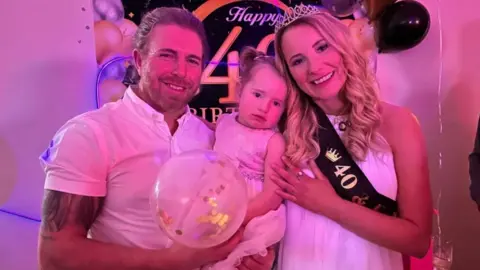 Louise Beevers
Louise BeeversSigns of cancer in pregnant women are being mistaken for potential symptoms of their pregnancy, it is feared. Concerns around potential misdiagnosis have prompted calls for greater awareness among healthcare professionals.
At the start of the year, Louise Beevers had everything to live for. She was turning 40 and expecting her fourth child. Fast forward to September and weeks after giving birth, a terminal cancer diagnosis robbed her of the chance of seeing her baby daughter grow up.
January 2023 brought an unexpected pregnancy when Louise and her partner, Alister, returned from a family holiday "with extra baggage". Their initial surprise turned to excitement for the future and a new addition to the family - but then Louise found a pea-sized lump in her breast.
However, she was told it was likely to be pregnancy-related when she went to see a doctor.
Louise, from Willingham by Stow, near Gainsborough in Lincolnshire, recalls: "I sort of skipped away, thinking 'OK, I don't need to worry about that, it's just my hormones' and I thought 'Let's concentrate on having this baby'."
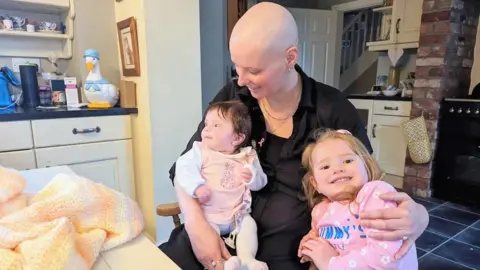 BBC/Alex Moss
BBC/Alex MossWithin a few months, however, the lump had grown into two distinct masses. In the May, at just over four months pregnant, she was diagnosed with breast cancer and underwent a radical mastectomy and lymph node clearance.
Then, just weeks after giving birth to baby Suzy, and while Louise was undergoing chemotherapy, the family were told the cancer had spread to her lungs and was incurable.
Suddenly, that earlier excitement for the future ahead was replaced with the knowledge she would be leaving Suzy, her three-year-old-sister, Avice, and two older siblings without a mum.
"No one healthcare professional can put a time on how long I've got left," said Louise, "and that is really difficult to deal with because I need to put plans in place for my children - special birthdays, life events. I want to write letters to them so they can open them if I'm not here.
"I'll take great joy in ripping up those letters if I meet those milestones with my children, but the cancer's in a free-for-all and it's going to choose where it goes."
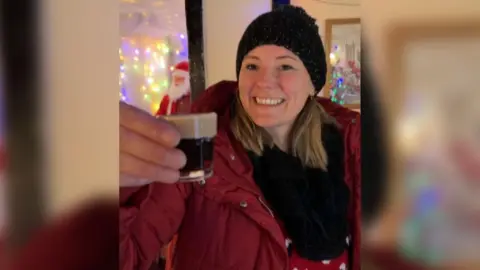 Louise Beevers
Louise BeeversLouise says she cannot help but think back to when she first found the lump. Had she been referred for further investigations then, would the outcome have been different?
Experts stress the sooner cancer is detected, the better the chances of survival. But often pregnant women's cancer concerns can be dismissed by healthcare professionals as symptoms of pregnancy with no further testing suggested.
Prof Richard Simcock, chief medical officer for Macmillan Cancer Support and a consultant clinical oncologist, says a diagnosis of cancer in pregnancy, particularly in the breast, is challenging.
"The majority of abnormalities in the breast are benign, but it's impossible to tell that just by an examination," he says.
"We encourage people to be assessed fully and properly, usually by a breast specialist with imaging."
Pete Wallroth's wife Mair experienced a cancer diagnosis in pregnancy. He set up the charity Mummy's Star after Mair died from the disease in 2012 aged 41, having being diagnosed while pregnant with their second child.
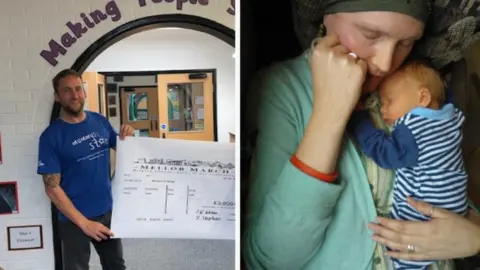 Pete Wallroth
Pete WallrothHe says the dismissal of symptoms early on is "by far and away the single biggest issue with cancer and pregnancy."
Many of the women supported by the charity - the only one of its kind in the UK - found those first symptoms were missed, which then allowed the cancer time to metastasise.
"Women's health full stop is beset by issues around dismissal of symptoms and feelings," says Pete.
"If a person is presenting with what would otherwise be a red flag symptom, irrelevant of their pregnancy, then it should be getting investigated straight away."
Cancer in pregnancy is rare - statistics suggest around one in 1,000 cases of breast cancer appear in pregnancy.
Data published in the British Medical Journal this year showed the average risk of dying from breast cancer in the five years after a diagnosis has fallen from 14% to 5% since the 1990s.
But Prof Simcock stresses that these findings are "down to early diagnosis".
He says: "Louise's story is very sad and I'm sorry she got the wrong answer at the time she was worried.
"If a person hasn't got a satisfactory answer, particularly if symptoms are not improving, then they should be empowered to return and ask for a referral."
He says the need for raised awareness is more pronounced because of the trend towards women having children later in life.
Prof Simcock explains: "Breast cancer is a disease that becomes more common as you get older, so the likelihood of pregnancy and breast cancer occurring at the same time increases.
"One of our jobs is to make sure we educate healthcare professionals involved in the care of pregnant women about how breast cancer can present itself at that time. That means educational initiatives with midwives, primary care professionals etc."
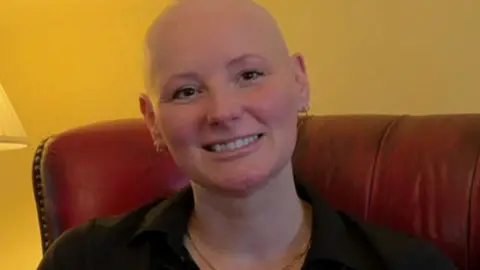 BBC/Caroline Bilton
BBC/Caroline BiltonMeanwhile, Louise's unfolding story points to a devastating ending for her and the family. She has refused her final chemo session because she doesn't want to risk spending what could be her last Christmas sick from the side effects.
Instead, her focus remains firmly on making the best memories with her family.
"My four children are my everything, but they're losing a mum and that role never gets replaced," she says.
"I want to make sure whatever time we've got together is the best. There's no time for tears.
"We're going to tell each other we love each other. We've got at least a billion times to say that before anything happens."
And while she faces uncertainty over how long is left to make those memories, she is desperate to prevent other women having to walk the same path.
"I'd urge anybody who finds anything remotely unusual to just please, go to your GP," says Louise.
"If you're not referred, insist on being referred. It's two minutes of that GP's time to get referred and get checked out and then hopefully it will be nothing.
"But then you can go home and get on with the rest of your life. But please, persist."

Follow BBC East Yorkshire and Lincolnshire on Facebook, X (formerly Twitter), and Instagram. Send your story ideas to [email protected]
